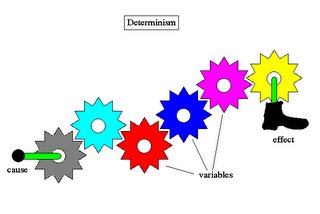Determinism, Belief, and Free Will
"Life is like a game of cards. The hand you are dealt is determinism; the way you play it is free will." - Jawaharlal Nehru
"Free will does not say that everything that is physically conceivable is also morally possible. It merely says that of alternatives that really tempt our will, more than one is really possible." - William James
"I can believe anything, provided it is incredible." - Oscar Wilde
"The curse of man, and the curse of nearly all his woe, is his stupendous capacity for believing the incredible." - Henry Louis Mencken
inconceivable: def-n: incapable of being conceived or thought of; unbelievable.
conceive: def-n: 1) to become pregnant with
2) to form in the mind; imagine
3) to apprehend mentally; to understand
4) to express in particular words
5) to think or believe or hold an opinion
from the Latin 'concipere' - "to take to oneself; to take into the mind." Go back to a point in your life when you first spoke a sentence starting with the words "I believe...". Write the rest of the sentence down on a piece of paper. Now repeat the exercise for each and every such sentence you have ever uttered, writing each on a separate paper. Repeat it again for each sentence you just thought about consciously, without having spoken it. Now again for all those you heard from others, and those you have read, and those others have thought about, from people you don't know, from people who are long since passed, from people not yet born. Now, write separate ones for each variation or modification, no matter how slight, of all the ones you've got so far. Just for good measure, chuck in all the contrary views to each one you already have (the NOT-BELIEF statements).
Go back to a point in your life when you first spoke a sentence starting with the words "I believe...". Write the rest of the sentence down on a piece of paper. Now repeat the exercise for each and every such sentence you have ever uttered, writing each on a separate paper. Repeat it again for each sentence you just thought about consciously, without having spoken it. Now again for all those you heard from others, and those you have read, and those others have thought about, from people you don't know, from people who are long since passed, from people not yet born. Now, write separate ones for each variation or modification, no matter how slight, of all the ones you've got so far. Just for good measure, chuck in all the contrary views to each one you already have (the NOT-BELIEF statements).
Shuffle them all up, and pick out a handful. Use them to guide the next day of your life.
Was it determinism that guided your hand to select the ones you did, or free will to choose from all possibilities? What if someone else arbitrarily chooses for you, but lets you decide if you'll accept the challenge (like "Who Wants To Be A Millionaire" type game shows, where you can gamble and proceed, or drop out now)? What if someone else {church, state, parent, peer....} chooses for you and imposes their choice on you? Do you still have the choice to {rebel, refuse, renounce, reject, modify, accept...} their choice ? Of course you do, there may be consequences that you don't want to accept, or perhaps are not even aware of.
Can you change your mind? Can you change your mind against your better judgement? Can you change your mind based on intuition, or gut feeling?
Can you ever become aware of the consequences that would have occured had you made the other choice? Does determinism make the undeniable case that therein lies the truth of determinism. By not being able to ever know the unfolding of the other option, since the option chosen would impact any attempt to "go back and do it differently", the options taken determine all action.
In the first quote above, what if you refused to play, or refused to accept the cards you were dealt while they were still face down? Is it still determinism? Given the cards you have, for many games and their rules, there is only one obvious way to play them. Does that contradict the ability to have free will in playing the game, when the only choice you have is survival or self-destruction, in "card game" terms?
In the second quote, doesn't it really say that at least one is possible, rather than more than one? So it's the card game choice again. You're never selecting between two viable options, you're selecting whether or not to select. The first view strengthens the case for free will (i.e. given two or more arbitrary options, I am at liberty to select the one of my choosing....what flavour ice cream will I have today?). The second view, strengthens the case for determinism (i.e. given a choice, do I make it? One choice must lead to 'better' (on some scale) with the other leading to 'NOT-as-better' on the same scale. The default mechanism in 'is' will choose the 'better' option for you (determinism), but you will always have the option to override and choose the 'NOT-as-better' selection (free will).
It makes intuitive sense that, if a system or theory is going to be used to identify any kind of universal pattern and apply any set of universal tenets, they must be selected so as to apply to any and all possibilities, and any and all possibilities will apply.
'is' allows for all possible belief structures by accepting the complete data base of "I believe..." statement possibilities, and applies to any possible subset selected from the wholeness, no matter by whom, or by what methodology. There 'is only one, singular belief system (probably more accurately called a belief collection). The beliefs that an individual or social grouping choose to select from the universal belief grouping, whether selected by free will, imposed by inheritance, culture or law are merely subsets of the entire belief.
The mere act of only choosing a subset introduces not only ignorance of the unknown choices, but the shared interactive zone between a selected subset and it's rejected (or omitted subset) is the zone turbulence, of misunderstanding, of rejection; it is the zone that Chaos Theorists are finding counter-intuitive patterns within. It is the zone that 'is' refers to as threshold.
This is an example of existence. The subset of 'belief' existence. It is a self-contained, self-reliant, capsule of complete existent, just as a point in a drawing is a holgraphic capture of the entire drawing. This belief collection has all the characteristics of {absortion, heredity, encapsulation, self-reproduction, free will, determinism, default, turbulence, ......} choose your descriptor. It is a mirror image of not only itself inwardly, but all else outwardly.
It is a tertiary system. There is the wholeness, there is the turbulence of crossover or separation, and there is selected subset. That is a foundational description of every component of existence, whether it be the most extreme minutia, or the gestaltic whole.
Existence at any scale creates three possible alternative states: exact opposite (the NOT-state), exact clone (the replicate state), or mirror image (the reversed state). These claims are made in tenet #5(c), but everything about 'is, to this point has been stated with the authority of "I have spoken it, therefore it 'is' ". Of course, this is an absurd position to take......on the surface. But, upon simple reflection, all that is lacking is one tiny detail, the inclusion of the scientific community into the model. For any universal model must by it's own design be universal. 'is' approaches the problem from a view of completeness, whereas scientific study has approached it piecemeal, or from a subset, although counter-intuitively. The scientific Chaos Theory is the mirror of the layman's 'is' theory, and the same mathematical proofs can (and will!) apply. They have to, if either theory is to be substantiated.
For the scientific sceptics in the crowd, perhaps you could use this as your starting point, which will be familiar grounds.
"Given Chaos Theory and all it's proofs, let 'is' theory represent all that Chaos Theory isn't".
Prove that they {are the same, intersect, crossover, meld, merge, oppose, are mutually consistent.......}.
"Given 'is' theory and it's tenets, prove that it 'is'."
...and perhaps you could start with James Yorke's paper, titled "Period Three Implies Chaos", in which he proved with mathematical rigour that in any one-dimensional system if a regular cycle of period three ever occurs, then the same system will also display regular cycles of every other length, as well as completely chaotic cycles.
In other words, if 3 occurs as a pattern or periodicity, it can be mathematically shown that the system is a universal one.


"I've learned that meeting interesting people depends less on where you go than on who you are." - Age 51












WELCOME HOME! The blue one is my favorite today, reminds me of whispy smoke!
Posted by KSHIPPYCHIC |
7:41 p.m.
KSHIPPYCHIC |
7:41 p.m.
Post a Comment